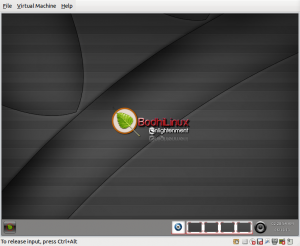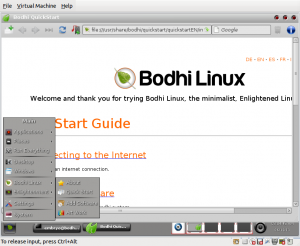I took some time to contact Jeff Hoogland, lead developer for Bodhi Linux, and asked him a few questions about the distribution he is in charge with.
TuxArena: Hello there, Jeff. Thank you for taking the time to talk with us about Bodhi Linux.
Jeff: Any time – I always love talking about projects I am involved with.
TuxArena: What is your position at Bodhi? Are you a professional programmer, or are you making this just for fun? How many developers are working at this time for it?
Jeff: I’m the lead developer/project manager at Bodhi. I take charge of creating the actual disc image that users download and I over see most of the things that go on in our community. I am a professional mathematician, not a programmer. I am currently a graduate student and Bodhi is a project I manage in my spare time.
Besides myself we have seven other “developers” that work on the project. By developer I mean they contribute code to some of the open source projects we use in the Bodhi distribution. The Bodhi team is many more than just the developers though. We also have one person that maintains all of our servers, three artists that design our themes/website, and twenty translators! Many hands make for light work as they say.
TuxArena: Please tell us, what is Bodhi Linux? What are its goals and how is it different from other distributions?
Jeff: Bodhi is what we call an “enlightened, minimalistic desktop”. The main thing that sets us apart from other Linux distributions is our choice of using the Enlightenment desktop as our primary interface. The minimalistic part of our description refers to the amount of applications you will find in Bodhi by default. Beyond the Enlightenment desktop we only include a file manager, webrowser, text editor and synaptic package manager.
Our main goal is to provide a functional, elegant Enlightenment desktop.
TuxArena: When and why did you start developing Bodhi?
Jeff: Bodhi development started just a short time ago in November of 2010. The reason I started the Bodhi project is because there were not any distributions at that time that offered a current Enlightenment desktop in an elegant manner. Bodhi now accomplishes this task.
TuxArena: Your distribution is quite new, but it’s already listed and reviewed by Distrowatch, where it has a pretty decent position. How do you see it succeeding and taking on with older and popular distributions? Or is this not necessarily a goal, since its requirements are pretty low?
Jeff: The Bodhi team and I are fairly happy with the amount of coverage we have gotten. The amount number of positive responses tells us that there is in fact a demand for a small, quick, elegant Linux distribution in today’s world. Criticism is important as well though, there is no doubting Bodhi is only as polished as it is today because of feedback from reviewers and our users.
As for our ranking on DistroWatch – as I write this we are ranked at 32 for a six month traffic average. Another thing we are very happy with considering our operating system has only been listed for the last four months. I’d imagine once we have been listed for the full six months we will settle somewhere in the top twenty listed on DistroWatch.
TuxArena: What kind of users are you aiming towards?
Jeff: Bodhi is aimed at users interested in the Enlightenment desktop and those that like their system free from clutter. Our rapid popularity indicates there is a demand for both of these things. We believe users should be smart enough to make their own choices. We don’t lock down your desktop and make it difficult to edit things like some of the newer desktops (such as Gnome 3 and Unity) have done.
TuxArena: The ISO image is only 382 MB in size. Is it both an installation and a Live disc for trying it directly without installing anything?
Jeff: The Bodhi ISO image is both a Live CD and an installation disc yes.
TuxArena: Bodhi Linux comes by default with the Enlightenment desktop. Does it support other desktop environments too?
Jeff: While we do not officially support other desktops – I know there are more than a few people that have installed LXDE and XFCE on Bodhi without issue.
Note I removed the LXDE bit as we do not ship that by default. We do use a few other their tools, but this is far from the desktop as a whole.
TuxArena: Please tell us what are the main components of Bodhi, from a user’s point of view. What are the main applications which come by default with the installation image?
Jeff: Well, as I mentioned before we ship a very trim number of default applications. We ship the latest Enlightenment desktop, Midori 0.3.6 (latest version), Leafpad text editor and PCManFM file manager.
TuxArena: The latest stable release is based upon Ubuntu 10.04 LTS. Do you provide certain repositories for software? What about updates?
Jeff: Even though we base ourselves on the Ubuntu LTS release that does not mean Bodhi users are also left with software that is year old (or more). Unlike a good deal of Ubuntu derivatives we maintain our own repository (not just a PPA) in order to provide software updates to our users. Beyond a current Enlightenment desktop we also ship current versions of a good deal of software, including Firefox and Chromium browsers.
TuxArena: Do you have a certain release cycle?
Jeff: At Bodhi we have both major and minor releases. Our minor release (point releases) occur every 3 months to keep our LiveCD up to date. Major releases will occur every two years to build on top of a new Ubuntu LTS base. Meaning the next major Bodhi release will be some time in 2012 and will be based off of Ubuntu 12.04
TuxArena: What is the role of the community in the development of Bodhi? Do you listen to suggestions, recruit new developers, keep IRC conferences?
Jeff: Community is very important to the development of Bodhi. A good deal of our communication and ideas are discussed via our forums, but we have an IRC channel as well. We are always looking for new developers/team members – if you are interested in helping out please contact us!
TuxArena: Finally, what made you choose this name? Where does the “Bodhi” term come from?
Jeff: The name “Bodhi” means “Enlightenment”. I actually found the name when Googling for synonyms for the word Enlightenment.
TuxArena: Thank you, Jeff, and good luck in continuing developing Bodhi.
Jeff: Thanks!
Nice interview,
We’ve translated it into Bahasa Indonesia here : http://tanyarezaervani.wordpress.com/2011/06/15/tokoh-ngobrol-dengan-jeff-hoogland-pengembang-bodhi-linux/#comment-359
Thank you,
Bodhi sadly includes the bloated (GNOME) networkmanager instead of connman which is very nice intergrated with enlightenment.






